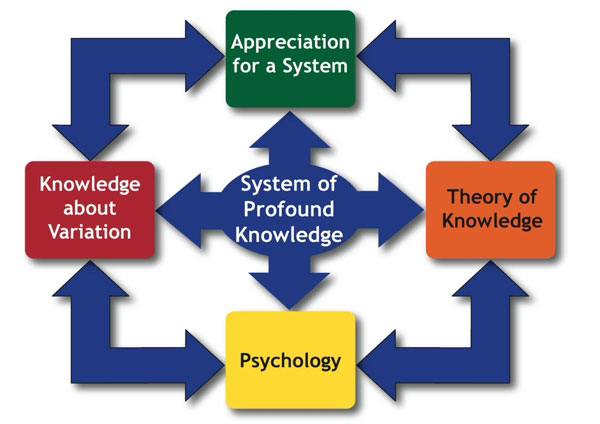A theory for improvement
In his last book, The New Economics for Industry, Government and Education (1994), Dr W Edwards Deming synthesised the knowledge he had gained over many years, working with many hundreds of organisations, into a framework of interrelated concepts to guide our improvement efforts.
He described what is needed by organisations as a System of Profound Knowledge. It comprises four key parts:
- Appreciation for a system
- Theory of knowledge
- Knowledge about variation
- Psychology.
The System of Profound Knowledge provides a foundation for continual improvement.
We have interpreted Dr Deming’s System of Profound Knowledge as 12 guiding principles:
Systems
1. Systems - People work in a system. Systems determine how an organisation and its people perform
2. Purpose - Shared purpose and a clear vision of excellence align effort
3. Processes - Improving systems and processes improves performance, relationships and behaviour
4. Clients - Clients define quality and form perceptions
5. Stakeholders - Sustainability requires management of relationships with stakeholders
Knowledge
6. Planning - Improvement is rarely achieved without the planned application of appropriate strategy and methods
7. Learning - Knowledge and improvement are derived from theory, prediction, observation and reflection
Variation
8. Data - Facts and data are needed to measure progress and improve decision making
9. Variation - Systems and processes are subject to variation that affects predictability and performance
People
10. Motivation - Removing barriers to intrinsic motivation improves performance
11. Relationships - Strong relationships are built through caring, communication, trust and respect
12. Leadership - It is everybody's job to improve the systems and processes for which they are responsible by working with their people and role modelling these principles
 We call these the Principles of Quality Learning. The principles are our interpretation of the current theory of how to bring about organisational improvement. They apply to student, teacher, leader, classroom and school, district and department.
We call these the Principles of Quality Learning. The principles are our interpretation of the current theory of how to bring about organisational improvement. They apply to student, teacher, leader, classroom and school, district and department.
Learn more about the guiding principles by undertaking a Quality Learning School Self-assessment.
Learn more about Systems, Knowledge, Variation (using data to improve), and People.
For most of us, trained in traditional management methods, the Quality Learning approach represents a profoundly different way of seeing the world. It is a truly different paradigm. Quality Learning for many of us is a new way of thinking, bringing with it the need for learning and un-learning.
I finally have a coherent philosophy that combines many observations and insights made over the years.
How to help my students become life-long learners and improve their own outcomes.
I feel as though I’ve connected the dots! At last!
Desiree Moore, Mullumbimby High School, NSW
Read and learn about these principles in our book Improving Learning: A how-to guide for school improvement.
Learn more about building capacity in Quality Learning through Professional Learning and customised support.
We never stop learning about improvement! The principles have great depth and power. To continue to learn about improvement through our experiences and those of other educators and leaders, sign up now to receive our emails.
